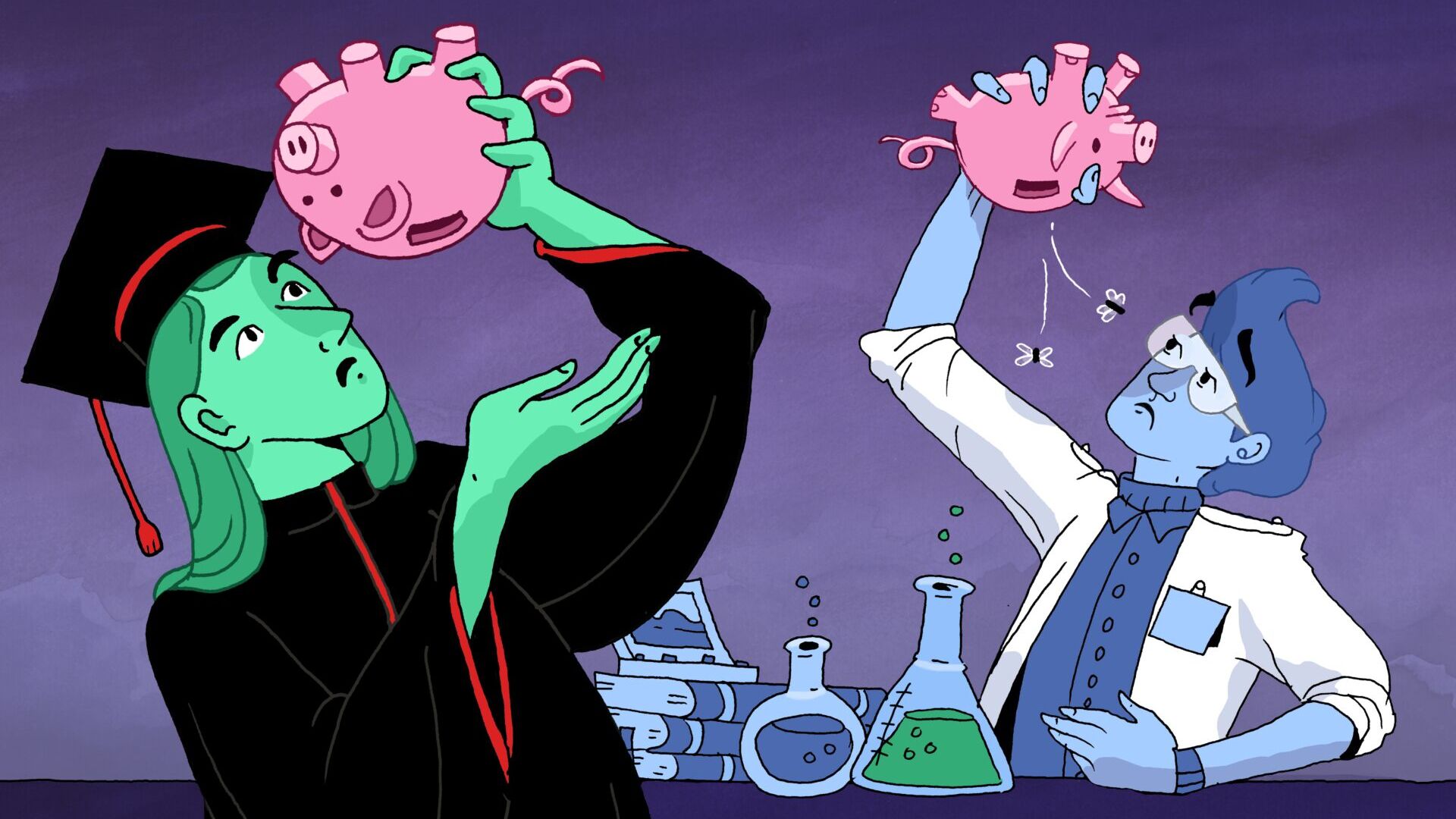Radboud University forced to make tough cuts, budget shrinks by tens of millions
-
 Illustratie: Ivana Smudja
Illustratie: Ivana Smudja
Cut back, and substantially too. That is what Radboud University is forced to do, now that the plans from The Hague are clear. Over the next few years, government funding will drop by 8%, the University calculated. ‘That is a tough challenge,’ says Vice President Agnes Muskens.
Thirty-six million euros. That is the amount that Radboud University has to save extra to remain financially healthy under the new government policy. This comes on top of the 18 million euros Radboud University already had to save last year and this year, due to national estimates of falling student numbers and increased wage costs and inflation.
‘There is not need for additional cuts in 2025, but after that the required savings rise to 35 million euros by 2029,’ explains Vice President Agnes Muskens. ‘That amounts to 8% of the primary revenue stream (government contribution, eds.).’
A ‘tough challenge’, as Muskens calls it. ‘We will have to think of how and where we can save that money structurally. Together with the faculties, we want to make good choices, so that we can keep the University’s finances healthy and stable.’
Reorganisation
One thing is already clear: the University hopes to be able to save a substantial portion of the 36 million euros on support services, both at Radboud Services and within the faculties. How much precisely, the Board does not yet know.
Hand on the purse strings
No faculty or university department will escape the cuts. But how do you handle such a project? In the coming weeks, Vox will be talking with the faculties: What can they save on, and what do they want to maintain at all costs? How much should these changes deliver and what will the staff and students notice? This is the first article in this series.
Last month, the University therefore launched a review of its operations chain. Following an initial scan, which is now taking place, two of the six divisions – HR, ILS, Marketing & Communications, Campus & Facilities, Finance & Control and Academic Affairs – will be reviewed before the end of this calendar year to explore where savings can be made. The Executive Board will decide at the end of this month which two divisions will be selected for this.
The review will be carried out by EY, an external consulting firm. Given the cost, is this justified in these financially austere times? ‘That is a fair question,’ says Muskens. ‘Speed, expertise, and an objective perspective are our main arguments for taking this approach. It is quite difficult to assess your own processes in terms of what needs to be different and better. To speed up this process across the entire university, EY is helping us by kicking off. We want to give people clarity as soon as possible.’
The Vice President says a reorganisation, with or without compulsory redundancies, cannot be ruled out. ‘It is a fact that some tasks and functions will have to be restructured. We want the cuts not only to save money, but also to optimise our services.’
Break-even in 2027
In addition to the support services, Radboud University’s seven faculties will also have to undergo some cuts. A few years ago, the faculties were already told to work towards a zero budget by 2027 – until then, they were allowed to make limited losses.
Even as declining revenues make it harder to break even by 2027, that assignment still stands. The reason, as Muskens explains, is the financial health of the University. If the University has to dig even further into its assets, it will be at risk.
But will the faculties succeed in balancing their income and their expenses? A VOX tour of deans and directors reveals that at least some faculties have major concerns about this. Some faculties are placing primary responsibility with the Executive Board and central services: What can they cut back on, to spare the faculties as much as possible?
‘If the faculties continue on their present course, it will be very difficult’
Agnes Muskens understands this reaction, but she says the central services will be hit at least as hard. ‘Radboud Services is by no means unaffected. We want to continue to give the pillars of our University, teaching and research, as much room as possible. But we all have to do this together and to make strategic choices. If faculties continue on their present course, it will be very difficult.’
In terms of cuts, the Nijmegen School of Management, which faced a budgeted deficit of 9 million euros last year, is a year ahead of the rest. What lessons did the Executive Board draw from this? Muskens: ‘The stringent measures we applied did have their effect financially. But it has not been easy, and there has been internal resistance. The financial situation remains austere, but the atmosphere at the Faculty is calmer and more peaceful.’
Deploying expertise more sparingly
Dwindling funding from The Hague has not stopped Minister Eppo Bruins from continuing to demand that universities ease the workload of their research staff.
However difficult the situation is, according to Rector José Sanders, it is therefore essential that, in addition to keeping a hand on the purse strings, room is also created in teaching. ‘Together with the vice deans of education, we are looking at how we can organise this. We do so by closely reviewing our offerings. Where are there duplicate courses within and between faculties? These are opportunities to deploy our expertise more sparingly, without compromising the quality of education.’
Sanders foresees that this crisis will strengthen the need to dismantle the boundaries between faculties and seek more collaboration. With a relatively high degree of faculty independence, Radboud University has some catching up to do in this respect, compared to some other universities. For example, faculties sometimes have to pay a high fee for their students to take a course at another faculty.
‘There are also funding opportunities in consortia where we are not yet exploiting our potential’
‘Obstacles like these don’t help us to move forward,’ says Sanders. ‘That is what the education organisation task force is currently looking into: What helps us to collaborate among ourselves, and what gets in the way? Think of differences in schedule, how study credits are calculated, or the various choices students are given.’ According to the Rector, this kind of collaboration is also an opportunity to better align study programmes with societal issues.
In addition to reducing expenses, Rector José Sanders and Vice President Agnes Muskens also hope to increase revenue. Sanders: ‘For example by looking at other sources of funding for research. There are still so many opportunities in consortia where we are not yet exploiting our potential, beyond the borders of our country, with other universities or with social partners, in business or in healthcare.’
Fewer international students
Although the administrators now have a clear picture of the sobriety task ahead, it is by no means certain that the cuts will stop here. The University remains dependent on the expected national inflow of students, which forms the basis for government funding for universities. If it is revised downwards, as happened recently, this will immediately create a budget deficit.
The concern is that these reference estimates will be revised downwards again in the near future. Indeed, the Dutch government has announced a package of measures to curb the inflow of international students. It is to be expected that this Internationalisation in Balance Act will further reduce student numbers. As a result, the overall budget for universities will shrink further, as will revenue from tuition fees.
‘The circumstances are forcing us, even more so than in the past, to invest in interfaculty collaboration’
Sanders: ‘It is disappointing, and also rather frustrating, that the government is now suddenly cutting on education and research instead of investing in the knowledge economy. And of course, the Netherlands is not an academic island. International students connect us to the academic world.’
And yet, the two administrators are not giving in to despair. They also see light at the end of the tunnel. ‘We are resilient and we will get through this together,’ says Muskens. ‘Maybe this crisis will help us strengthen our position, discover other revenue streams, and start new collaborations.’
Sanders: ‘The circumstances are forcing us, even more so than in the past, to invest in interfaculty collaboration. That can also bring us closer.’




